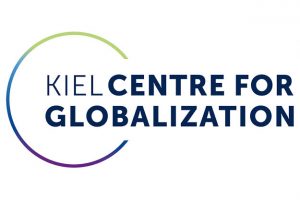Research Report on Trade for Development in Ghana Published Today

A new research report “Can Trade Foster Development? Firm-level Evidence for Small- and Medium-sized Enterprises (SMEs) in Ghana” as a key output of the KCG research project “How can Trade Contribute to Development? Micro-based Evidence for Ghana” is published and available online today. The research project has been funded by the German Federal Ministry for Economic Cooperation and Development (BMZ) and by Deutsche Gesellschaft für Internationale Zusammenarbeit (GIZ GmbH). The report was prepared by Prof. Holger Görg Ph.D. (KCG Managing Director) and Cecília Hornok, Ph.D. (KCG Fellow), in cooperation with Prof. Dr. Charles Ackah from the Institute of Statistical, Social and Economic Research of the University of Ghana. GIZ co-reviewed the report. An earlier version of the report was presented for discussion with key local stakeholders in Ghana on May 21.
The report provides new evidence on the benefits of exporting and importing among Ghanaian manufacturing SMEs. Based on a unique firm-level dataset for the years 2011 – 2015 for Ghana, the authors estimate the effects of firms’ exporting and importing activities on their productivity, employment, wages, skill structure, training activities and gender equality.
Their research results show that firms benefit from exporting. Firms that start to export employ more workers and pay higher wages, in particular to skilled workers. Exporting activity in a region also stimulates non-trading firms, which are able to also pay higher wages and move towards hiring more skilled workers. In contrast, starting to import production materials does not have any clear direct effects on the firm. However, positive spillover effects from importing on the wages and skill intensity of neighbouring non-trading firms are found. It is particularly worth noting that the positive spillover effects are found to accrue only to firms that already have a relatively high share of skilled workers, suggesting an important role of firms’ absorptive capacity in this regard. As to gender issues, they find that female-owned SMEs miss out on the beneficial effects of exporting. These firms do not only have a more limited potential to grow and enter the export market than male-owned businesses, but they also fail to hire more workers or increase wages when they start to export.
Based on their research findings, the authors provide five key policy conclusions. First, promoting exporting activity in the manufacturing sector can be a route for fostering development. Second, fostering skill development should be an important aspect for policy. Designing and implementing initiatives for skill development may also take into account the role of skills in trade-driven development. Third, policies pursuing gender equality should consider giving targeted support to female entrepreneurs not only to access export markets, but also to turn export success to business growth. Fourth, more research needs to be done to gain more insights into why Ghanaian SMEs – unlike firms in other developing countries – cannot benefit from importing. Last but not least, more efforts and resources should be invested in data collection to enable related future empirical research of high quality.
